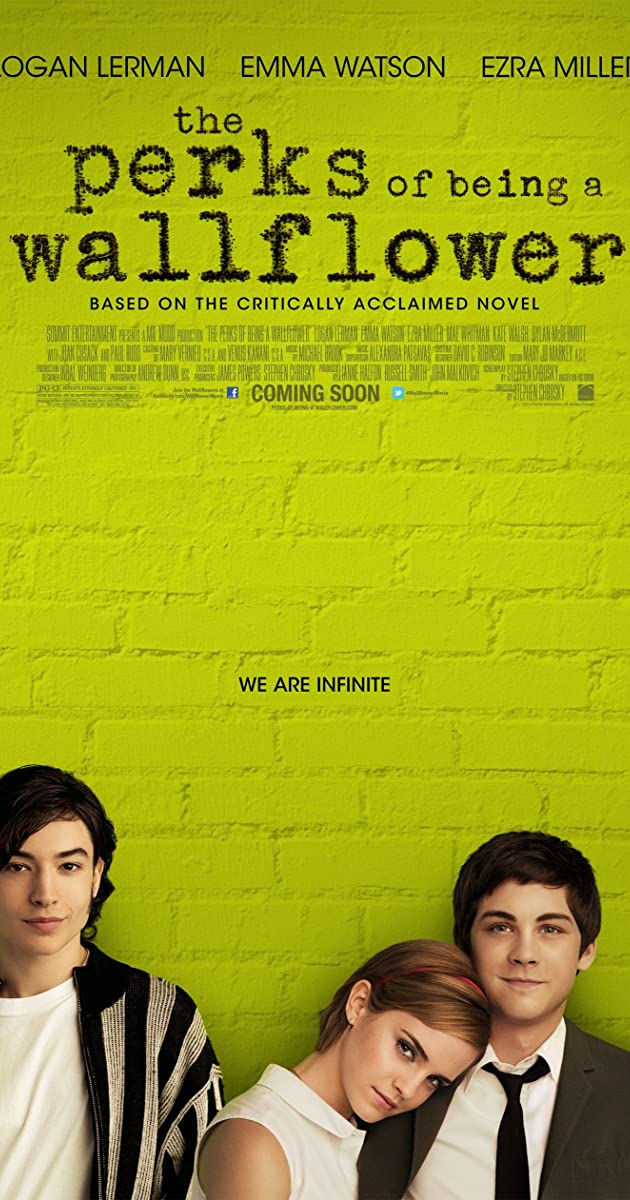
Meng
Perks Of Being A Wallflower: Differences Between Its Film and the Book
Imagine this: a book being adapted into a film ten years after its publication. Why would it be adapted ten years later? In 1999, the author Stephen Chbosky published his fantastic story, The Perks of Being A Wallflower. Over ten years later, Chbosky finally adapted his novel into a successful screenplay. The film captured lots of complex themes in the book; however, what are the differences between the two works? There are three major differences between the movie and the book.
To begin with, Charlie’s family does not appear frequently in the film than in the novel. The film focuses more on Charlie, the main character, and his journey through high school, relationships, friendships, and trauma, leaving us a wide space to imagine how his family would be like. On the contrary, his family has a much bigger presence in the novel. For example, his father is depicted as an intricate and decent man in the film, which gives him a sense of mystery; however, his father was actually abusive to Charlie when he was little and sexually abused by aunt Helen. Moreover, the film cuts out a crucial moment that influences his value of love deeply—his sister is actually in an abusive relationship, and Charlie witnesses her boyfriend bullying her, and she forbids him to snitch on her. Afterward, the relationship between Charlie and his sister deteriorates rapidly. We could still take a glimpse at the scene in the film; however, it is far less significant in the plot. In general, the book gives us a more comprehensive perspective of all the characters and makes it closer to our lives; however, the film presents a close-up look into Charlie’s life and his inner world.
Secondly, we could see much more vivid presentations of characters in the film. For example, Charlie’s teacher, Mr. Anderson, prefers to be called his first name Bill, we get to see his amazing class energy than just indulging in the talk on the paper. It’s true that Charlie talks about Bill’s teaching methods in the novel, but in the movie, we are able to see Bill as a more intriguing and wiser mentor. In the film, he still mentions the famous quote, “We accept the love we think we deserve", but he also tries to kindle the passion in his students in a more vivid way. Moreover, Patrick, one of Charlie’s best friends, lights the screen on fire in the film. We all know that the character Patrick is a little loud and crazy. However, Patrick played by Ezra Miller in the film adds more flavor to the character—like the crooked clock that was supposed to be as round as a normal clock in the classroom scene. With Miller’s acting, we could get to see a glimpse of Patrick that we’ve only seen through Charlie’s eyes in the novel.
Last but not least, two different background soundtracks which go along with the drive in the tunnel scene both in the book and the film are mind-blowing. In the novel, the background soundtrack that Charlie plays in the car stereo as he stands outside the car, “Landslide”, sung by Fleetwood Mac was replaced with “Heroes” by David Bowie in the film. Charlie stands outside the vintage convertible, feels the wind on his face, and says he feels “infinite” in the tunnel that they were driving through. This is a small detail, but it leaves us a very strong impression. “Landslide” is slow, a little tragic, and melancholic; and Bowie’s song is uplifting and full of eagerness. It gives the feeling of “infinite” a whole new vibe and meaning.
The differences between the two works in narrations, presentations of different characters, and soundtracks are arguably distinct yet successful. I adore both the film and the novel, for both of them capture the ache of growing up in the early nineties so uniquely and perfectly.
Sources of the book and the film
https://www.mtv.com/news/2769297/perks-of-being-a-wallflower-book-movie-differences/
https://screenrant.com/perks-being-wallflower-book-movie-comparison-logan-lerman/
https://en.wikipedia.org/wiki/The_Perks_of_Being_a_Wallflower
https://en.wikipedia.org/wiki/The_Perks_of_Being_a_Wallflower_(film)




